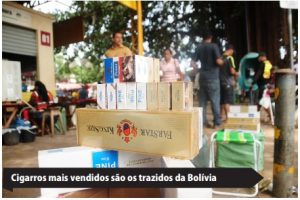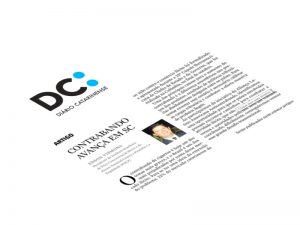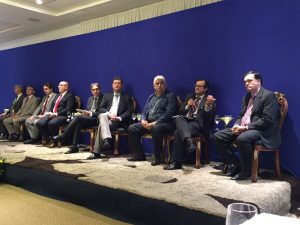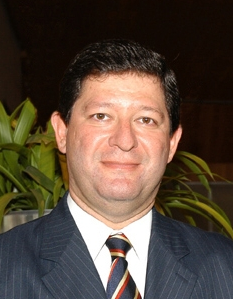In an article published on 28/10, in the Correio Popular de Campinas newspaper, the President of ETCO, Edson Vismona, talks about the first meeting of ALAC - Latin American Anti-Smuggling Alliance, the danger that smuggling poses, in addition to providing specific data on Southeast region.
Contraband advances in Campinas
by Edson Vismona
Cigarette smuggling is now one of the most serious issues and Brazil is one of the most affected by this illicit market. To get an idea of the extent of the problem, 30% of the Brazilian cigarette market is dominated by brands from Paraguay, who enter the country without paying taxes, without generating jobs and still do not respect the rules of health surveillance.
Currently, 41% of the São Paulo cigarette market is dominated by illegal brands. Of the 10 best-selling brands in the state, two are from the illegal market, with the Paraguayan brand Eight leading the market with a 25% share of sales. In addition, the average price of the smuggled pack is R $ 3,00, an amount 60% lower than the legal minimum price for cigarettes in the legal market.
In 2015, the sale of contraband cigarettes grew by 18% in relation to 2010, which represented a tax evasion of R $ 748 million to public coffers, money that could have been invested in areas such as health, safety, housing, among others. public policy.
In Campinas the situation is also serious, since 37% of the cigarettes sold are smuggled from Paraguay. The city is also an important central point in the distribution of smuggled cigarettes in the State of São Paulo. Cities like Limeira, Tietê, Salto, Jundiaí, Bragança Paulista, among others, receive loads of contraband cigarettes from Campinas
This illicit trade directly affects tax collection, public policy development, consumer health and job generation in the state of São Paulo. However, the situation is even more serious. We are also dealing with national security, since organized crime, which feeds on smuggling, is dominating border regions in Brazil and in other countries in Latin America.
In this context, smuggling is no longer just a local concern and has taken on a continental dimension. It is estimated that each year in Latin America, between 0,9% and 2% of GDP is lost due to illegal trade. In order to try to find alternatives to fight these illicit acts, the Latin American Anti-Smuggling Alliance was created, composed of 15 countries: Argentina, Bolivia, Brazil, Chile, Colombia, Costa Rica, Ecuador, Guatemala, Honduras, Mexico, Panama, Paraguay, Peru , Uruguay and Venezuela.
The first meeting of the Alliance was held in early October in Bogotá, the capital of Colombia. Representatives of governments, civil associations, companies and trade unions in the member countries met to discuss and establish shared actions that allow greater control over the illegal trade in cigarettes, textiles, beverages, food, plastics and metals.
Based on the discussions, an action plan against illicit trade, covering several proposals evaluated at the meeting, will be formalized and presented during the XXV Iberoamerican Summit of Heads of State and Government, which will be held in Cartagena, Colombia, on the 28th and October 29.
It is worth remembering that one of the main causes for the increase in smuggling is the startling difference in the prices of products, the result of absolutely unequal tax policies between countries. While in Paraguay cigarettes pay taxes that do not exceed 16%, in Brazil this percentage can reach more than 80%.
In other words, the higher the tax burden on national products, the more competitive the illegal product becomes and the more the population suffers from the increase in crime, drug and arms trafficking.
To try to reverse this scenario, one of the measures proposed during the Alliance workshop is cooperation between countries for a tax calibration with the aim of reducing the enormous advantage that smugglers have over national industries. Another cause that must be tackled is the massive supply of illegal products. Intelligent coordination between countries is needed, with online information exchange and structured actions to control free trade zones and customs regimes.
By participating in the initiative of the Latin American Anti-Smuggling Alliance, we have identified an opportunity for the countries involved, including Brazil, to find common ways to combat illegal activity, which does not respect borders, governments and police authorities. Without coordinated work, with intelligence and mutual cooperation, we will hardly be able to overcome this great transnational challenge.
* Edson Vismona is president of the Brazilian Institute of Ethics in Competition (ETCO) and of the National Forum Against Piracy and Illegality (FNCP)
 The cigarette market in Acre is dominated by 26% of imported cigarettes, illegally. In 2012, this percentage was 9%. Because of the lower price compared to national products, due to the non-collection of taxes, illegal tobacco brands gain market with each passing year, according to Datafolha research.
The cigarette market in Acre is dominated by 26% of imported cigarettes, illegally. In 2012, this percentage was 9%. Because of the lower price compared to national products, due to the non-collection of taxes, illegal tobacco brands gain market with each passing year, according to Datafolha research.






